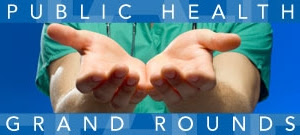
We are pleased to present the January session of CDC Public Health Grand Rounds, “Staying Ahead of the Curve: Modeling and Public Health Decision Making.” This session will be available via live webcast from CDC headquarters in Atlanta, Georgia on Tuesday, January 19, at 1 p.m. (ET).
Where are infections spreading? How many people will be affected? What are some different ways to stop the spread of an epidemic? These are questions that the public and decision makers, including health officials, often ask during an outbreak or emergency. In a process known as modeling, scientists analyze data using complex mathematical methods to provide answers to these and other questions during an emergency response. Just as models are used to predict the path of a hurricane, models can be used to predict the impact of interventions during an epidemic. Modeling is helpful in more than just emergency situations, though. For example, models are also used to predict when the next flu season will start and to decide which flu strains to include in the flu shot each year.
Models provide the foresight that can help decision makers better prepare for the future. Modelers attempt to use all available data to formulate predictions. As more data accumulate, the accuracy of predictions improves. Models can also help us understand situations that were unclear in the past by looking at old data in new ways. With models, decision makers can look to the future with confidence in their ability to respond to outbreaks and public health emergencies.
Join us for this session of Public Health Grand Rounds as we discuss what insights models can provide, how modeling has informed responses in public health, and where modeling can lead the public health community in the future.
Future Grand Rounds topics include chronic fatigue syndrome, addressing health disparities in early childhood, and using genomics to prevent cancer.
Email your questions about this topic before or during the session. Follow us on Twitter #cdcgrandrounds
CDC’s Public Health Grand Rounds Presents:
“Staying Ahead of the Curve: Modeling and Public Health Decision Making”
Tuesday, January 19, 2016
1:00 p.m. – 2:00 p.m., ET
Global Communications Center (Building 19)
Alexander D. Langmuir Auditorium
Roybal Campus
Presented By:
Lauren Ancel Meyers, PhD
Professor, Department of Integrative Biology
Department of Statistics and Data Sciences
University of Texas at Austin
“Modeling to Support Outbreak Preparedness, Surveillance and Response”
Martin Meltzer, PhD
Lead, Health Economics and Modeling Unit
Division of Preparedness and Emerging Infections
National Center for Emerging and Zoonotic Infectious Diseases, CDC
“What Do Policy Makers Expect from Modelers during a Response?”
Daniel Jernigan, MD
Director, Influenza Division
National Center for Immunization and Respiratory Diseases, CDC
“Application of Modeling and Forecasting for Preventing Influenza”
Richard Hatchett, MD
Chief Medical Officer
Deputy Director for Strategic Sciences
Biomedical Advanced Research and Development Authority
Office of the Assistant Secretary for Preparedness and Response
“Explaining Phenomena, Providing Foresight, and Making Predictions”
Facilitated By:
John Iskander, MD, MPH, Scientific Director, Public Health Grand Rounds
Phoebe Thorpe, MD, MPH, Deputy Scientific Director, Public Health Grand Rounds
Susan Laird, MSN, RN, Communications Director, Public Health Grand Rounds
For non-CDC staff interested in viewing the session:
A live external webcast will be available. For individuals who are unable to view the session during the scheduled time, the archived presentation will be posted 48 hours after each session.
For non-CDC staff who wish to attend in person:
Due to security measures at CDC’s Roybal campus, non-CDC staff who wish to attend these sessions in person must have prior clearance and a US state-issued photo ID (e.g., driver’s license, US passport).
Names of non-CDC staff (both domestic and international) should be submitted to the Grand Rounds Team. Please note that all information for international visitors must be submitted at least 10 days in advance.
For individuals requiring reasonable accommodations:
It is the policy of CDC to provide reasonable accommodations (RA) for qualified individuals with disabilities to ensure their full inclusion in CDC-sponsored events. Employees are asked to submit RA requests at least 5 business days prior to the event. Please e-mail the request to grandrounds@cdc.gov.
Grand Rounds is available for Continuing Education.
ALL Continuing Education hours for Public Health Grand Rounds (PHGR) are issued online through theCDC/ATSDR Training and Continuing Education Online system. If you have questions, e-mail or call Learner Support at 1-800-418-7246 (1-800-41TRAIN).
Those who attend PHGR either in person, Envision, IPTV, or “web on demand” and who wish to receive continuing education must complete the online seminar evaluation. Thirty days from the initial seminar the course number will change to WD2346 and will be available for continuing education until February 18, 2016. The course code for PHGR is PHGR10.
Target Audience: Physicians, nurses, epidemiologists, pharmacists, veterinarians, certified health education specialists, laboratorians, others
Objectives:
- List key measures of burden of disease involving morbidity, mortality, and/or cost.
- Describe evidence-based preventive interventions and the status of their implementations.
- Identify one key prevention science research gap.
- Name one key indicator by which progress and meeting prevention goals is measured.
CE certificates can be printed from your computer immediately upon completion of your online evaluation. A cumulative transcript of all CDC/ATSDR CE’s obtained through the TCE Online System will be maintained for each user. We hope that this will assist CDC staff and other public health professionals to fulfill the requirements for their professional licenses and certificates.





















.png)









No hay comentarios:
Publicar un comentario